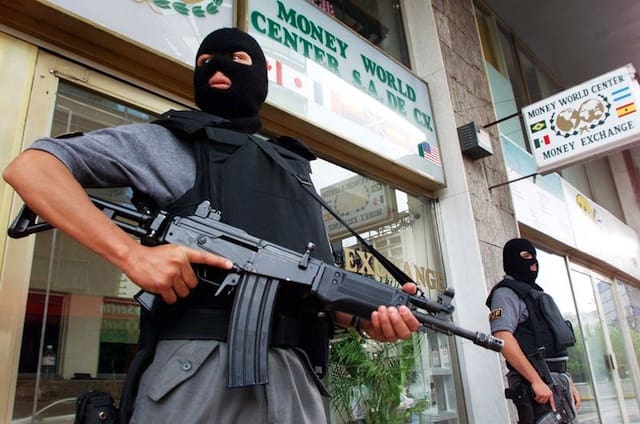In Badlands: From Ground Zero of the Immigration Crisis Along the Mexican Border, the Village Voice puts faces on the people that have to live with or die from the border problems between Arizona, New Mexico, and the failing state of old Mexico. But despite the title, immigration seems to be less of a worry to locals than the violence that accompanies the importation of drugs: “On March 27, a well-liked 58-year-old cattle rancher named Rob Krentz was murdered on his family’s ranch. Rob was working, literally out in the middle of nowhere, with his dog, … But his ranch is right smack in dope-smuggling country. It wouldn’t have been unheard of for him to have just bumped into a bad guy out there, one who happened to be carrying a gun.” We’re not talking spree killings here, we’re talking constant peril from a known enemy – and little or no support from law enforcement.
“I’m always looking, and I always carry a rifle,” says Rich Winkler, a cattle rancher who lives with his wife, Mary, at the base of the forbidding Peloncillo Mountains on the Arizona/New Mexico line, about 20 miles north of the Mexico border. “There could be someone in the barn or behind a rock. You can’t get sloppy with it. That’s when they’ll get you.” …
Seldom does a week pass without the Winklers coming upon illegal aliens on their ranch, occasionally carrying loads of marijuana in backpacks. Rich compares their situation to a scene in the movie No Country for Old Men, in which dire consequences await the poor souls who cross paths with drug smugglers. “When a rancher happens onto a load of dope on his property, he’ll usually just leave it alone,” Winkler says. “There are [drug] scouts watching us, seeing where we are and what we’re doing, and we don’t want them to think we’re an issue. The brazenness is what gets me. The illegals trample our land, leave their garbage behind, smuggle their poison in, and change the way we live our lives.”
The Winklers’ home has been broken into twice (in one day, actually), and their cabin in another part of their expansive ranch has been burglarized so many times they’ve lost count. … At night, after I got back home I was in my jammies in my bedroom and noticed a light on that shouldn’t have been. I grabbed a pistol and slowly stepped out. There were people inside my house! … I was very scared. Luckily, they ran out. This is my home, goddamn it! I shouldn’t have to put up with this.”
With the rapid depletion of oil extracted from their cash cow, the giant oil field of Cantarell, Mexico’s economy is flat-lining. Even in recession, the US provides an irresistible market for both desperate laborers, the coyotes that prey on them and unscrupulous drug traffickers. The traffickers have more money than the government, and the wealthy of both nations turn a blind eye to the influx of drug money. But while politicians try to look proactive with nationally-publicized calls for walls, fences and troops, the locals don’t see an easy answer:
“If you put up a wall, you need to have someone watching it,” says Bill Odle, who lives with his wife, Ellen, on 50 border acres. “And if someone is watching it, you don’t need a wall.”
Odle … is a retired U.S. Marine, a Vietnam War veteran who loves his country and hates the federal government and the influx of illegal immigrants, probably in that order.
“If there’s a guy wanting to work up here, and he’s hungry, a damned wall isn’t going to stop him,” Odle says. “And that definitely goes for the people who want to do us harm, people transporting that shit that we do not need. The hell of it is, a lot of [undocumented aliens] do want to do honest work. I get that.” …
Bud Strom, the old rancher and Army general, is skeptical that larger National Guard presence on the border is a positive move.
“Unless they are really savvy to the sophistication of the drug cartels, I don’t think they’ll be of immediate use,” Strom says of the guardsmen. “They’d have to be trained to the methodology that drug smugglers are using down here, and it’s not an overnight thing.”
I like to think we could solve immigration by finding the political will to find and prosecute coyotes and illegal employers. I don’t know what to do about the drugs. I’ve read opinions that the drug war is over – and we lost.





Donal: The mistake was in using the terminology of warfare which implies that there is a definite end to hostilities. Drugs are crime and the "war on crime" will exist as long as there are those who break the law, which of course, there will always be.
Notice that doctors don't talk about "war on disease" and imply that once the "war" is over there will be no diseases. Drug use and crime are like diseases of society. They will always be with us, but at the same time, we also have to vigorously fight them.
http://cluborlov.blogspot.com/2010/03/bullets-fro…
Comments are closed.